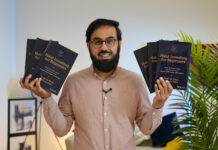I’ve only been in Cairo for a few days but it seems like everyone here has a different diagnosis of the country’s problems and a different solution for it, writes Roshan Muhammed Salih.
Yesterday I went for jummah prayers at the Rabaa Adawiya mosque in the Nasr City area of Cairo. On my way there I passed the stage where President Anwar Sadaat was assassinated in 1981. This is still an Islamist area and a stronghold of the Muslim Brotherhood whose president Mohamed Morsi just got deposed by the army.
Tens of thousands of people gathered for the prayer in the scorching heat while they were fasting. The sun was so intense that men went around spraying water on everyone’s faces to give them some relief.
Everyone was searched as they came into the area although the inspections seemed to be pretty cursory. As we approached the mosque itself (which is named after a famous sufi) it became almost impossible to move. We had to inch forward like you do on hajj before we finally reached the masjid.
The vast majority of people there were pro-Morsi but there were a minority of people who weren’t with the Brotherhood but did believe a coup against democracy had just taken place.
Military coup
The atmosphere was stoic but friendly. Journalists were welcomed and Morsi supporters were keen to tell them that a military coup had just taken place in the country. The “legitimate” president had been deposed because the secular, liberal opposition (aided by the army) couldn’t actually win a vote at the ballot box.
Subscribe to our newsletter and stay updated on the latest news and updates from around the Muslim world!
There were also harsh words for the liberal media which has backed the coup and is accusing Brotherhood supporters of provoking instability in the nation. Some pro-Morsi people have also convinced themselves that the coup was planned by the military establishment in conjunction with America.

The khutba itself consisted of the Quranic story of the Pharoah’s dictatorial, merciless rule – a very direct reference to the military establishment in Egypt. After the prayer duas were made for the 50-odd Brotherhood supporters who were killed in clashes at the nearby Presidential Palace on Monday; prayers were also made for the welfare of Palestinians (some of whom are allegedly being held at Cairo airport and are being prevented from crossing the Rafah border); as well as the usual duas for the victory of the “Syrian people.”
But despite the rhetoric at Rabaa Adawiya it is very unlikely now that Morsi will return to the presidency and I got the feeling that the ikhwaan realise this. But they also feel that they have to make a point and they say they will do it peacefully.
That said, what struck me was the sheer number of people who are outraged at the military’s decision to topple Morsi and their willingness to openly defy the authorities and condemn them. These people are very disgruntled and believe they have been robbed, cheated and persecuted. And they comprise a large minority of Egyptians so that represents a huge problem in terms of national reconciliation.
Maidan Tahrir
After I left the Rabaa Adawiya area I headed towards Maidan Tahrir in central Cairo, the scene of huge anti-Morsi demonstrations not so long ago. I had been warned by foreign journalists to be wary of people there who were furious at the international media narrative that a military coup had just taken place.
To my surprise hardly anyone was there – a few hundred at most. Anti-Morsi flags adorned the area, as well as tributes to the army and accusations that the Muslim Brotherhood was being supported by the West.
The atmosphere in the square was slightly threatening with people constantly asking who we were and expressing scepticism at the response. We were surrounded by people who wanted to tell us that the Egyptian army was a great institution that had saved the country from corruption, chaos and dictatorship. Others were keen to call ikhwaan supporters “brothers and sisters” and urged them to stop protesting in the interests of national unity.
Also to my surprise there were plenty of veiled women in Maidan Tahrir expressing similar sentiments, which cast doubt in my mind about the “Islamists versus secularist” narrative we constantly hear in the mainstream media.
So at the end of the day it was really hard for me to draw any definitive conclusions about what had taken place and about the future of Egypt. I had talked to perhaps 50 different Egyptians throughout the day and it seemed like I was getting 50 different opinions.
I just hope that Egyptians can find a way of living with their differences instead of going down the path of Libya, Iraq or Syria where they try to settle them with violence rather than dialogue.
@RMSalih






















